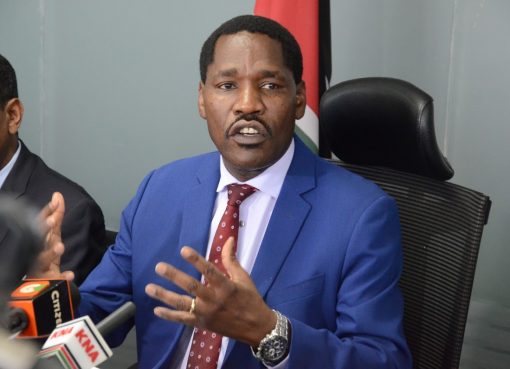Kenya’s economic blue print Vision 2030 seeks to see the country industrialise as it moves to become a middle income earner and this is only possible with a reliable and cheap source of energy.
Energy drives all aspects of economic activities from agriculture, manufacturing, transportation, commerce among many others.
The Government Spokesperson, Col. (Rtd) Cyrus Oguna while addressing the press on Thursday said energy remains the most essential component for industrialisation and more so for countries like Kenya which requires to move its industrial base to a new level.
“To drive industrial growth, a country needs to invest in affordable, stable and reliable source of energy and for Kenya that has been identified as coal fired power and one of such plants is to be constructed in Lamu County,” Oguna said.
“Once commissioned in 2024, the Lamu based coal power plant will be the main source of power to drive the manufacturing sector and the big4 initiative which will in return create jobs,” he explained.
Oguna added that the coal power plant will be the anchor source of power for the projected Special Economic and Industrial Zones as well as the Lamu-Port South Sudan-Ethiopia Transport (LAPPSET) corridor project.
“As you may be aware, industrialisation requires a reliable, stable and cheaper source of energy which will make Kenya a more attractive investor destination,” he posed.
Oguna explained that once established the coal power plant will generate over 1, 000 Mega Watts (MW) which will add to the country’s current capacity of 2, 712 MW against the country’s industrial power need of 5, 000 MW.
“Coal energy will also help in the gradual replacement of the diesel power plant in Mombasa which has aged and is currently expensive to operate,” said Oguna.
The project has been receiving controversial media reports in regard to the cost of financing, ownership and environmental issue.
But the government spokesperson explained that the project was a Public Private Partnership (PPP) and Kshs.200 billion will be injected by a private developer who will recover the investment through selling of power to consumers until the year 2050.
“The cost of power to the consumers will be much lower compared to the currently available power sources. The cost will be at 7.8 US cents/Kw which is cheaper compared to current geothermal cost of 8.24 US cents/Kw while thermal is 36 US cents/Kw,” highlighted Oguna.
On issues raised about environmental impacts, Oguna said the Lamu coal plant will use the Ultra-Super critical (USC) a very modern technology famed for High Efficiency-Low Emission (HELE) levels and Kenya will be the first country in Africa to possess the technology.
“Environmental and Social Impact Assessment (ESIA) was conducted and a report prepared. However, the matter is currently before a court of law and cannot be discussed further until the courts make a ruling,” he said.
Oguna dispelled allegations that Kenya was embracing coal energy while other countries were cutting back on the same, saying that countries such as Germany, Malaysia, United Arab Emirates, Turkey among other who ratified the Paris agreement and are going back to coal energy.
Paris Agreement is a UN led initiative to combat climate change and the need to intensify investment in a low carbon future.
“There is no country in the world which has industrialised without using coal power, other countries that use coal to power their industrial base include India, South Korea, Japan, USA and South Africa,” said Oguna.
“A comparative analysis of Kenya’s energy mix reveals that it is only coal and geothermal that can effectively drive our industrial needs. The mix comprises of geothermal 50 percent, Hydro 28 percent, Wind/solar 12 percent and thermal 10 percent,” he highlighted.
He added that though Kenya has massive potential on geothermal energy, geothermal power generating plant takes between 7-8 years compared to only 30 months for coal energy while solar and wind energy are susceptible to weather changes whereas potential for hydro has been exhausted.
Responding to those alluding there was no public participation; Oguna said that a public participation committee was steered by the Lamu governor in 2014/2015 with different sections of the communities across the county represented.
Oguna called on Kenyans to put nationalism and the interest of the country first, saying people should question those who are much against the project, their source of funds and those who are behind their loudest noise.
“Coal energy will be a game changer for Kenya and there are many people who do not want to see us develop and industrialise so that we remain a market for their goods,” he said.
By Joseph Ng’ang’a



